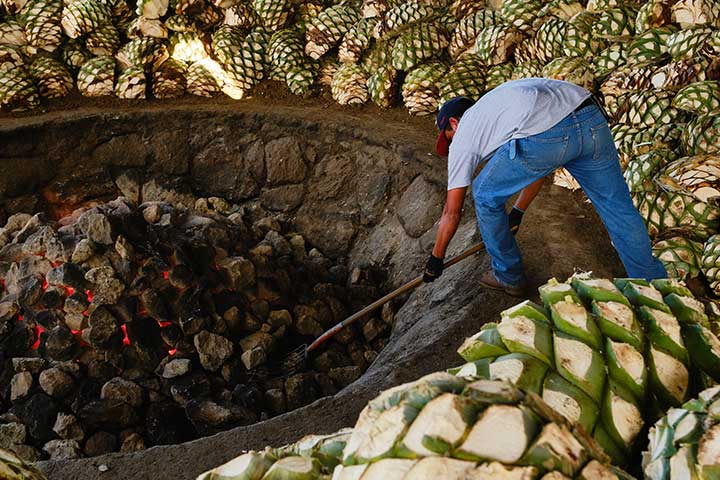
Mezcal Amarás
Eight years ago, a slice of Mexico with its flavour and aromas arrived in Ibiza in the form of Mezcal Amarás. Eight years that have revolutionised cocktail bartending on the island thanks to a drink that was relatively unknown in Spain until recently, but that is winning new fans every day due to its complex flavours.
Amarás makes its mezcal following the same ancestral methods that have been used to distil this valuable spirit, obtained from cooked agave, in Mexico for centuries. In fact, the world mezcal, from the Nahuatl “mexcalli”, means “oven-cooked maguel (agave)”, which was how the Pre-Columbine peoples consumed this holy plant.
Casa Amarás distils its mezcals using seven different species of agave. Different varieties of wood are also used to cook the agave hearts or piñas, giving them a characteristically smoky flavour and a wide range of unexpected flavours and notes, making Amarás mezcals perfect for using in cocktails and enjoying alone.
What’s more, using different varieties of agave and wood to cook the piñas means that Amarás can produce and sell a large portfolio of mezcals with different notes, textures, aromas and flavours.

Agave
From the seed to the glass
Casa Amarás knows that, to make a good mezcal, every step is equally important, and it therefore takes great care at every stage of the distilling process. This starts with choosing seeds from the strongest agave plants with the best genetic characteristics because the plants only reproduce once in their lifetimes (between the ages of 7 and 35) before dying.
Once the seeds have been harvested, they’re planted in deforested land to produce chemical-free agave plants. When the plant matures, the agaves are picked and their leaves removed, leaving just the heart or piña. This is cooked by master mezcal makers the old way, i.e. in a cone-shaped stone oven dug into the ground and heated by burning natural wood in a process that lasts between 3 and 5 days. This gives the piña time to cook and be lightly smoked before it’s chopped up by hand and put in a stone mill to extract its elixir.
Cooked and ground agave is known as bagazo; it’s put in 1,000 l vats, water from deep wells is added, and the mixture is fermented naturally with local bacteria for an undetermined length of time that only an expert mezcal maker knows.
When it has fermented naturally due to the local bacteria, the bagazo is put in copper stills and heated by a wood-burning fire in an artisan distillation process; again, the temperature and length of time are controlled by the expert eye of each master mezcalero who decides the exact moment when the mezcal is ready to be drunk, ending the cycle.

Amarás Family
Responsibility, sustainability and social commitment
The name Amarás reveals the company’s identity, its love of Mexico, the land that created mezcal, and the sun, which was so vital to Pre-Columbine cultures. It supports small-scale farmers and master mezcal makers, helping them to earn a dignified livelihood through fair trade initiatives while preventing the loss of ancestral knowledge and techniques.
Amarás is a love of the land, of Mexico and its thousand-year-old culture, the traditions of a multicultural country, of fields bathed in light and sunshine where agave plants grow, following the sun’s cycle and spreading their long leaves up to the skies.
Company management is aware that producing mezcal means generating a carbon footprint, particularly when the agave hearts are cooked and the liquid is distilled in stills heated by wood-burning fires, a centuries-old tradition. The company therefore offsets its carbon emissions by buying credits that finance projects that use and generate sustainable energy, making its mezcal the first carbon neutral mezcal.
At Amarás, company initiatives on social and environmental responsibility go even further, and it allocates a percentage of its sales income to actions that demonstrate its commitment to the environment. These programmes include reforestation and recovering wild agave species, and running, in conjunction with the WWF, activities to protect the forests, soil and the essential resource that is water.






